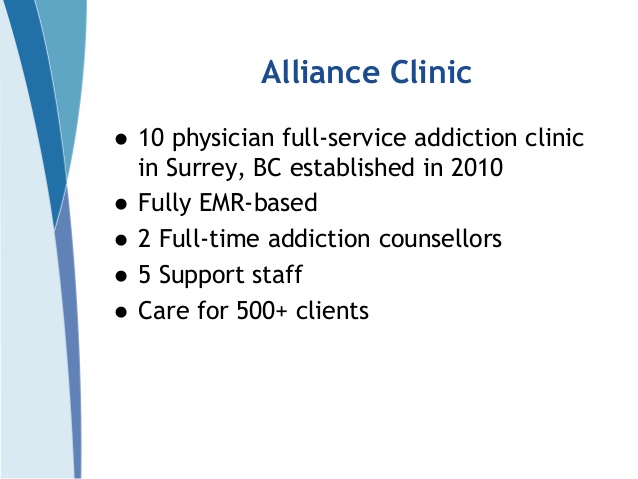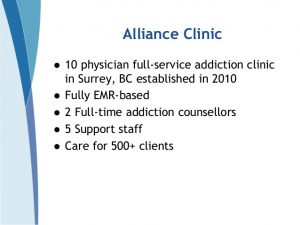
Alliance Clinic – Prenatal Information
 Congratulations on your pregnancy. This will provide you with some information on the prenatal care available through our clinic.
Congratulations on your pregnancy. This will provide you with some information on the prenatal care available through our clinic.
You are welcome to do your prenatal care at Alliance with your regular addiction doctor and see one of the Alliance doctors who attend deliveries at Surrey Memorial Hospital before your delivery. You should meet one of the “delivery doctors” by 32 weeks. Earlier is great too.
If you have any urgent concerns related to the pregnancy such as bleeding, decreased fetal movements premature labour, need to detox or stabilize substance use, etc. please present to the Family Birth Unit at Surrey Memorial Hospital 24 hours a day.
The “Surrey Prenatal Clinic” or SPNC is the call group that covers for Dr. Patricelli’s maternity patients. Please register at the Family Birth Unit any time after 20 weeks of pregnancy.
Routine prenatal visits are:
- Every 4 weeks up to 28 weeks of pregnancy
- Every 2 weeks between 28-36 weeks of pregnancy
- Every week from 36 weeks until baby is born
- Your doctor may see you more often if you are also being treated for opioid dependence or other substance use during the pregnancy.
Routine blood work and urine tests are needed during each trimester of the pregnancy. You will need a “dating obstetrical ultrasound” which confirms your due date, as well as a “detailed obstetrical ultrasound” which looks at the baby’s anatomy, location of the placenta, and gender if you request. Please note that the gender is only correct 95% of the time on ultrasound. This means they mistake a boy for girl or the opposite 5% of the time.
Babies who are born to mothers who are on certain medications during the pregnancy need to be monitored after birth. This includes babies born to women on opioid replacement therapy. This monitoring is called observation for “NAS” or “Neonatal Abstinence Syndrome”. There is significant research demonstrating both methadone and Suboxone are safe to use in pregnancy. In general, the babies with the least symptoms of NAS are those whose mothers are not using street drugs i.e. Chipping, relapses and continued use of street opioids or stimulants pose a greater challenge.
Breastfeeding is recommended for babies with NAS unless the mother is actively using street drugs or has HIV (or recent risk for HIV), or has Hepatitis C with bleeding nipples.
If you have risks for HIV at the time of delivery i.e. sex or shared needles with someone who has HIV, or could have HIV please tell the labour doctor because we have medications to prevent transmission we can give you during the labour just in case.
Talk about your birth plan with your doctor. If you are concerned about pain management there are a variety of options. Narcotics in labour can be used for labour pain, but are challenging as they can create false positive urine tests, as well as be difficult to reverse in a baby who is opioid dependent. Usually, the hospital doctor will recommend showers, walking, massage, and laughing gas (Entonox) if you are on opioid replacement therapy.
Urine drug screens at the hospital may be helpful for you if you have a history of substance use. Often MCFD (Social Workers) will want them. You should be asked to provide consent for these tests. You might ask for the test at the beginning of labour before receiving any pain meds if you think your social worker will want this. There are many substances that can give you a false positive on drug screens and confirmatory testing can take time, even in the hospital. You should know this for your informed consent. You can decline the urine drug screen at hospital during pregnancy or labour, but it can be to your benefit to do it. If you have ongoing substance use in pregnancy, we recommend that you do a self-referral to a social worker before delivery as this can be to your benefit. It is your choice.
If you are planning a C-section, the doctor from the SPNC will assist the surgeon for your surgery. Let the clinic know the date it is booked.
At the birth, for moms who are stable, on opioid replacement therapy the baby rooms in with the mother for breastfeeding support and observation of baby for NAS. It is s very important to cuddle and hold the baby and spend a lot of time doing “skin to skin” which helps the baby through withdrawal. You will stay a minimum of 72 hours for observation of NAS (longer if the baby is having withdrawal). The baby will need to be weighed every day after discharge until they are gaining well. Sometimes we use formula to supplement these babies as they can have higher energy needs. This being said, we work hard to get the breastfeeding well established as it takes a lot of stimulation by baby at the breast to “call in the milk” and is the best for the baby. Some women choose not to breastfeed, this is your choice. In general, there are more NAS symptoms in babies who are not breastfed and more likely to need morphine treatment. Most of the mom’s who are stable on Methadone/Suboxone at delivery are discharged home with their babies after a few days of observation.
Some women plan to adopt out. If you are thinking about this, we encourage you to have a healthy pregnancy and connect with resources to help support you through this.
Public Health is invaluable. Find out where your Public Health Unit is. The nurses can do a home visit if needed after delivery, or you can bring the baby in to the Public Health Clinic. They have many resources about breastfeeding and newborn care.

Leave a Reply
You must be logged in to post a comment.